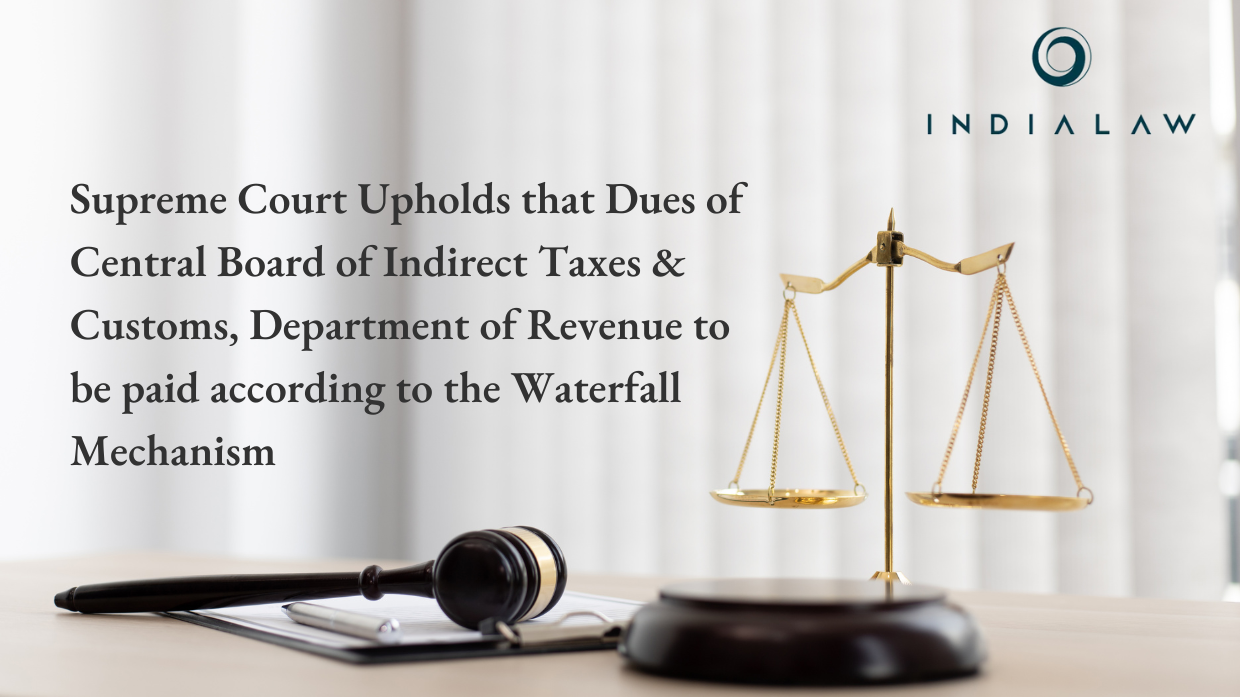Supreme Court Upholds that Dues of Central Board of Indirect Taxes & Customs, Department of Revenue to be paid according to the Waterfall Mechanism

In a notable Judgment dated 30.10.2023 in the case of Principal Commissioner of Customs V Rajendra Prasad Tak & Ors[1], the Hon’ble Supreme Court held that the dues of the Central Board of Indirect Taxes & Customs, Department of Revenue, are to be paid in accordance with the waterfall mechanism as provisioned under Section 53 of the Insolvency and Bankruptcy Code, 2016 (“IBC”).
Quick review of the Waterfall Mechanism
Section 53 of the IBC provides the order of priority in which the proceeds from the sale of liquidation assets of the Corporate Debtor shall be distributed amongst its stakeholders. The creditors are thus ranked in a hierarchical structure, giving this provision the name of “Waterfall Mechanism”.
Under this Mechanism, the first priority is given to Corporate Insolvency Resolution Process (“CIRP”) Costs, which are paid in full. Next priority is given to debts owed to secured creditors along with workmen for 24 months preceding the commencement of the liquidation which are paid pari passu amongst them. . Third in line are the dues to the employees (who are not workmen) upto 12 months preceding the commencement of the liquidation and debts. Thereafter come the dues of unsecured creditors, which are low at priority, followed by dues of Central Government & State Government upto 2 years preceding Liquidation Commencement Date. Least priority is given to preference shareholders followed by equity shareholders
Facts of the instant case
The Corporate Debtor i.e., KVK Nilachal Power Pvt. Ltd. was admitted into CIRP under the IBC by the Hon’ble National Company Law Tribunal (“NCLT”).
Thereafter the Hon’ble NCLT passed an order of liquidation of the Corporate Debtor pursuant to which an e-auction sale was conducted by the Liquidator. An application before the NCLT was filed by the successful bidder of the e-auction sale wherein he sought concessions, reliefs and waivers. A relief was sought in the said Application to waive all custom duty liabilities for benefits availed under Mega Power Policies. The Hon’ble NCLT granting the relief, directed the bidder/ Applicant to approach the concerned authority.
Aggrieved by the order of the Hon’ble NCLT, the Principal Commissioner of Customs (“Appellant”) approached the Hon’ble National Company Law Appellate Tribunal (“NCLAT”) challenging the order of the NCLT. The appeal was dismissed for being filed beyond the period of limitation as per Section 61 of the IBC, that deals with appeals and appellate authority. Consequently, the Appellant approached the Hon’ble Supreme Court against the dismissal order of the NCLAT.
The Issue before the Supreme Court
Whether the dues of the Central Board of Indirect Taxes & Customs should be paid according to the Waterfall Mechanism as specified under Section 53 of the IBC?
Decision of the Supreme Court
The Supreme Court bench comprising of Justices Sanjiv Khanna and S.V.N. Bhatti, while disposing of the appeal concluded that the dues of the Central Board of Indirect Taxes & Customs, Department of Revenue, shall be paid as per Section 53 of the IBC and according to the waterfall mechanism.
Conclusion
The Supreme Court’s judgment is remarkable as it highlighted the legislative intent behind the IBC provisions. The Court, while determining the priority of payment of dues to the Central Board of Indirect Taxes & Customs, clarified that the creditors and stakeholders are to be treated fairly and equitably in insolvency proceedings.
[1] CIVIL APPEAL NOS. 6432-6433 OF 2023
By entering the email address you agree to our Privacy Policy.



